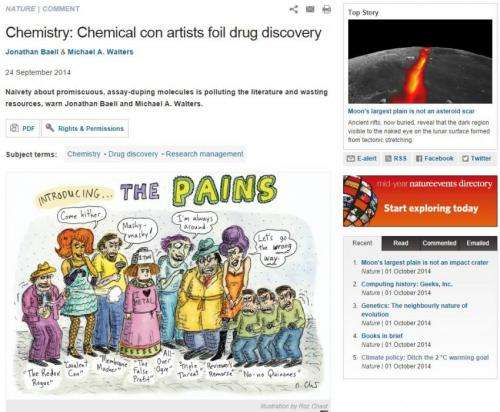October 2, 2014 report
Chemists warn scientific community of research dollars and time being wasted on PAINS

(Phys.org) —Chemists Jonathan Baell with Monash University and Mike Walters with the University of Minnesota have together published a Comment piece in the journal Nature bemoaning the testing of chemicals that have already been found to be pan-assay interference compounds (PAINS) in scientific research efforts—impressively, they include humorous cartoons (created by noted New Yorker cartoonist Roz Chast) to stress their points. They suggest researchers conduct more research on such compounds before embarking on new research that tests them for use as possible therapies for certain ailments.
With some ailments, researchers are able to identify certain proteins produced by the body that are misbehaving—if that happens the researchers then embark on a campaign (known as an assay) to find a chemical that can stop that protein from doing whatever bad thing it is doing, thus, curing the ailment. Unfortunately, there are a host of chemicals that can when applied to the research, cause results that look like they bind to the protein in question, and defeat it, but don't actually, but return results that make it look like they did anyway. That's what PAINS are. Many hits are artefacts, Baell and Walters note and they are concerned that researchers new to the field are wasting valuable research dollars by testing chemicals for use in disabling proteins that others have already found to belong on the PAINS list. Those new to the work are doing "muddled" science they claim and need to be educated on how to properly proceed when doing such work.
The researchers offer three broad tips for both established researchers and those brand new to pharmaceutical work, particularly those in academic environments—first, they suggest everyone learn about already known disreputable structures, in other words start at the beginning. Next, it might be a good idea to check the literature—if others have already done work with a certain chemical and put it on the PAINS list, they no doubt wrote about it as well. Why not read their papers to see what happened and by so doing, avoid wasting a lot of time and money repeating the work. Finally, they suggest researchers assess the assays, thereby providing a platform of sorts for everyone else working in the field.
More information: Nature: Chemistry: Chemical con artists foil drug discovery, Jonathan Baell& Michael A. Walters, www.nature.com/news/chemistry- … ug-discovery-1.15991
Journal information: Nature
© 2014 Phys.org


















